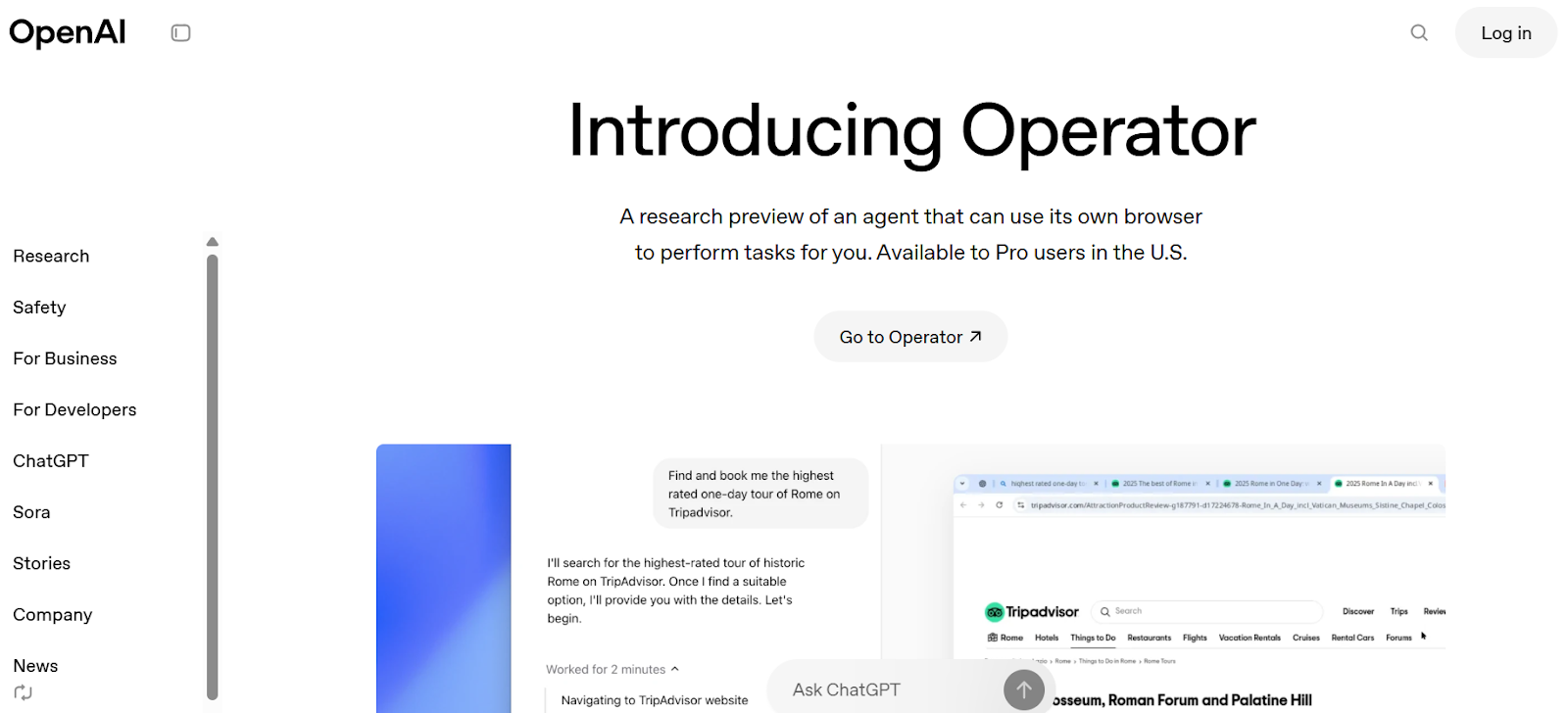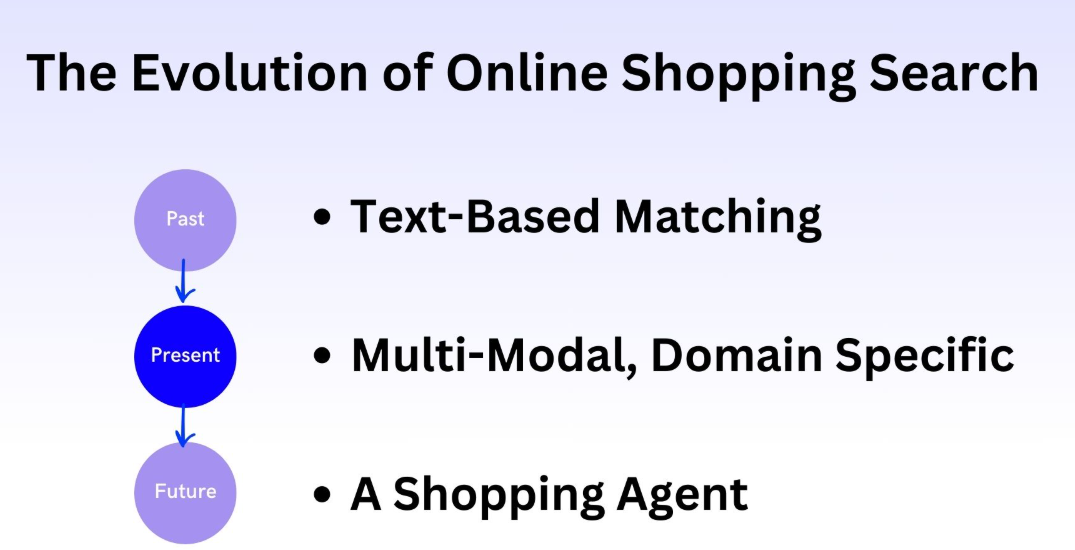The world is moving to a smarter era of online shopping that is much more than just scrolling through static product lists. It’s more about curating personalized experiences, predictive search, and intelligent recommendations that adapt to each shopper’s needs and preferences. This shift is reshaping eCommerce into a proactive marketplace where AI can predict what consumer wants even before they actually type.
The main credit for this evolution goes to AI shopping agents. These are smart digital assistants that not only provide recommendations but also help customers find, compare and purchase products with more confidence and better customer support. According to a recent report, AI agents in the eCommerce market are continuously rising, with the global market expected to surpass $282.6 billion by 2034.
With the rise of the AI shopping assistants, one thing is clear: adapt or be forgotten, because AI shopping is about contextual understanding, it’s about creating a retail experience that feels personalized, predictive, and effortless at every touchpoint.
So, in this write-up, we will help you understand what AI shopping agents are, how they impact AI eCommerce SEO, and why they are important for the next decade of eCommerce search.
What Are AI Shopping Agents and Why Do They Matter?
In simpler words, AI shopping agents are your personal shoppers that guide and enhance your overall shopping journey. These are intelligent systems that read live shopper signals and act instantly across Product detail pages (PDPs), Product listing pages (PLPs), carts, and checkout.
Unlike traditional chatbots, AI agents like OpenAI Operator can research, compare, and even anticipate your needs and make purchase decisions instantly. For AI ecommerce SEO, AI agents adapt in real time to shopper behavior, helping websites rank higher while offering personalized experiences.
Driven by AI, these agents make use of Machine Learning, Natural Language understanding, and predictive analytics to:
- Understand user queries/ questions in conversational language.
- Execute tasks without any manual intervention to provide shoppers with instant responses.
- Differentiate between different product listings across retailers.
- Adjust product detail page layouts based on browsing depth.
Real Also: Top 10 AI Shopping Assistant Tools for E-commerce
What is OpenAI Operator and What Does It Mean for eCommerce?
OpenAI operator is an advanced AI agent that is designed to handle web-based tasks, including eCommerce on behalf of users. It’s an Agentic AI that works much like ChatGPT that can navigate through websites, fill out forms, and perform various online tasks such as: shopping online, booking reservations, ordering groceries, comparing prices across retailers, and more. It’s more like a virtual assistant with human capabilities like clicking, scrolling, and typing with minimal user input.

Unlike traditional shopping assistants, OpenAI Operator adopts a new model: CUA, or Computer Using Agent. It works in the following way:
- It opens web pages inside a virtual browser.
- Takes screenshots of those rendered pages.
- Interprets the visual elements to understand what actions to take (such as clicking buttons or entering text).
This approach is quite different from traditional crawlers or scrapers, which rely on accessing and parsing HTML. OpenAI Operator uses the images and interprets the various visual indicators to understand web pages like humans do, making it highly flexible across diverse eCommerce sites.
- For retailers, it’s time to make a shift because your customers may not directly interact with your website in a traditional sense. Instead, AI agents evaluate your products, price, and other content in order to determine and make purchase decisions.
As customers directly discover products through AI agents, the eCommerce website owners need to take AI agents not as competition but as a preview of what their own digital experiences need to look like: intelligent, conversational, and intent-driven.
AI Agents Are Redefining SEO and Product Optimization
As AI shopping agents become an integral part of the shopping journey, it’s almost changing the rules of eCommerce visibility. AI eCommerce SEO is shifting towards user intent optimization rather than just keywords. It is therefore crucial for brands to focus on conversational queries, personalized recommendations, and effective content that AI agents can easily interpret and act on. Additionally, AI product search optimization ensures your products are discoverable, understandable, and appealing to AI assistants.
More than 70% of the customers prefer interacting with an AI agent when shopping online. The reason is that AI agents provide personalized recommendations.
For example, when a shopper asks ChatGPT, “What is the best sustainable food for cats?” Here, the user is not just browsing; they are looking for expert guidance that goes beyond product names. They want actual reasons, reviews, ratings, and direct purchase links. AI agents like ChatGPT and Perplexity not just recommend you, they also recommend your competitors. For retailers, it poses a challenge as you need to match or exceed the intelligence of AI agents. Therefore, your website must deliver:
- High-quality, intelligent product recommendations.
- A proper contextual explanation of why this product or service fits the shopper’s requirements.
How AI Agents Guide Every Step of Your Shopping Journey?
AI shopping agents play a crucial role in enhancing your overall shopping experience. From first click to discover products and services to post-purchase assistance, here’s how AI agents make your purchase faster and more confident.

Step #1: Discovering products and services (Before Purchase)
Rather than just typing in the search bar, users can interact with AI agents conversationally. For queries such as “Show outfits for an outdoor event in 40 degrees”, the agent will highlight relevant products across various categories. Similarly, for queries “Show me the best fashion sneakers for this winter,” AI agents act as a style assistant, suggesting items that align with a shopper’s needs, tastes, and intent.
Step #2: Comparison
The agent will give you a comparison list of multiple retailers with their prices, reviews, shipping needs, etc.
Step #3: Personalization
AI shopping agents remember your past queries and provide results based on your past interactions. For example, if the customer has previously purchased an eco-friendly clothing material, it will give more preference to sustainable products.
Step #4: Decision Support
AI agents provide the pros and cons, offer alternatives, and can even predict a product’s satisfaction level based on consumer sentiments.
Step #5: Post Purchase Assistance
Once the purchase is made, AI agents help you with follow-up questions like “What is the return policy?” They also enable eCommerce teams to send post-purchase emails, like requesting a product review, track deliveries, process returns, etc.
Main Applications of AI Agents in eCommerce
AI agents work to their utmost potential when applied in DTC (Direct To Consumer). They help the brand provide a better shopper experience by personalizing site engagement for visitors based on their behavior on a site and their traffic sources, avoiding lost sales by addressing abandoned carts in real-time, and driving higher order values by using smart-pricing and personalized offers. Here are some of the main applications:
1. Optimizing the Shopper’s Journey
Shopping paths like landing pages, carts, checkouts, etc, aren’t always straightforward. AI agents create contextual flows that respond to each visitor’s intent and behavior:
- Paid Traffic (Meta Ads): When a user arrives from a Meta ad, the product detail page layout adapts to showcase relevant bundles that align with their ad’s message.
- Organic Search: A shopper who reaches through an organic search will see reviews, testimonials, and user-generated content (UGC) first, giving social proof.
- Loyalty Programs: For returning customers, they offer a more personalized experience, such as early access offers, exclusive deals to boost repeat purchases, and build loyalty.
2. Cart Abandonment Recovery
Cart abandonment is one of the biggest concerns for DTC. The average online shopping cart abandonment rate is 70.22%. AI agents act in-session and minimize the chances of drop-off even before it happens:
- Nudging visitors at the last moment: When a visitor tries to go back, they are offered discounts, free shipping, or additional benefits to encourage them to stay and complete the purchase.
- Smart Bundling: When a shopper adds any item to the cart, complementary products are shown to prompt users to add more related products.
3. Intelligent Pricing and Customized Offers
Consumers today expect deals and offers customized for them personally, rather than general offers that don’t feel like they apply to them. AI agents track data points such as cart contents, item preference, and seasonality to create dynamic, personalized offers:
- Limited inventory notifications: When the stock of a product is low, a countdown banner is triggered to help motivate the consumer to make a quicker decision to purchase it.
- Deals based on the contents of a consumer’s cart: Personalization provides for an “add more, save more” offer when the cart value is close to the designated threshold for free shipping or discounts.
- Seasonal Adjustments: Seasonal bundles and limited supply offers are highlighted to meet holidays, schedules, events, or marketing campaigns they may be aligned with.
AI Agents Vs AI Chatbots Vs Automation
Many people and even markets often get confused between AI agents, AI Chatbots, and automatic systems. However, it’s very important to distinguish between them, especially for DTC growth. Here are some of the main differences to consider:
| Category | AI Chatbots | AI agents | Automatic Systems |
| Function | Scripted replies like answering FAQs, generating a product description, tagging data, etc | Autonomous decision making. | Rule-based execution, e.g., “If cart abandoned → send reminder”). |
| Flexibility | Can’t adapt beyond the specific scope (trained model) | Tracks and adapts to live shopper signals and context | Helps in scaling tasks, but more rigid. |
| eCommerce Example | Can auto-generate a product copy for a new SKU | Detects cart exit → instantly surfaces bundle offers or urgency nudges on the PDP/checkout. | Sends a generic coupon even after cart abandonment |
| Value | Saves time, reduces the time for manual responses | Acts like a teammate, cuts customer acquisition costs, and increases average order value. | Minimizes manual effort but is still reactive. |
Don’t Wait! Prepare Your Business For AI Shopping Agents
Brands must rethink their strategies to win this new digital landscape, driven by AI shopping assistants. Here are some of the essential strategies you need to adopt:
1. Establish AI-Ready eCommerce Infrastructure
- Deploy APIs that will interface efficiently with AI shopping assistants.
- Confirm that your eCommerce platform is engineered for structured data and voice searches.
2. Utilize Data Intelligence
- Gather and assess customer data to leverage personalized marketing.
- Utilize predictive analytics to start anticipating customer purchasing behavior.
3. Enhance Product Content
- Don’t just provide basic product descriptions—also have usage guides, product comparison, and FAQs.
- Include rich media content, which will aid the AI in better understanding your products.
4. Prioritize Customer Experience
- There should not be extra efforts involved with your return policy, provide various payment options, and a standard delivery process.
- AI agents reward retailers who consistently demonstrate customer satisfaction.
5. Utilize AI-Enabled Tools
- Employ AI-driven SEO tools to optimize your listings.
- Robust AI chatbots can resolve issues, supplementing shopping assistants, which provide ease to your customers.
Challenges In The Age of AI Agents
While the future of AI shopping agents looks promising, e-commerce businesses must also identify and address these challenges to make a trustworthy and sustainable use of AI agents.
- Data Privacy: Given that AI agents depend heavily on user data, it will be important to ensure compliance with policies like GDPR and CCPA.
- Increased Competition: AI-powered shopping assistants will bring relevance and value to the shopping experience, resulting in increased competition, especially with low-quality listings.
- Technology Costs: Businesses will need to invest in tools, training, infrastructure, and resources to implement AI-optimized systems.
- Dependency on Platforms: Businesses may become dependent on AI ecosystems controlled by the major technology platforms.
Conclusion
The rise of AI shopping agents is not technological; it’s a psychological evolution that is reshaping shoppers’ trust, control, and expectations in real time. AI agents are helping consumers to shop through conversations, turning commerce into an intent-driven journey where buying feels seamless and intuitive. To gain visibility in AI eCommerce SEO, businesses must focus on creating conversational and contextual product content and optimizing for real-time personalization.
As AI agents continue to rise, traditional keyword strategies are not enough; businesses should shift their focus to AI product search optimization, ensuring their services are visible to both consumers and AI agents. Although there are some challenges to deal with, it presents an opportunity to fulfil modern customer expectations and outperform your competitors.
AI shopping requires an updated approach to eCommerce. So, if you are still confused about where to start, partner with ResultFirst. With years of experience in providing professional eCommerce SEO services, ResultFirst ensures your utmost visibility in the AI era of AI shopping. From conversational content to AI product search optimization, we align your SEO strategies with exactly how AI agents interpret and present services to shoppers. Partner with ResultFirst and make your e-Commerce business stay ahead in this AI-driven search landscape.
FAQ’s:
WHAT TO READ NEXT
READY TO BUILD PREDICTABLE ORGANIC GROWTH?
We are the only TOP SEO services agency providing Real Results in a Real Performance model. We help growth hungry companies outperform their competition and achieve 300%+ growth in their digital marketing initiatives.
- San Jose, CA, 95120
- +1-888-512-1890
- sales@resultfirst.com

















